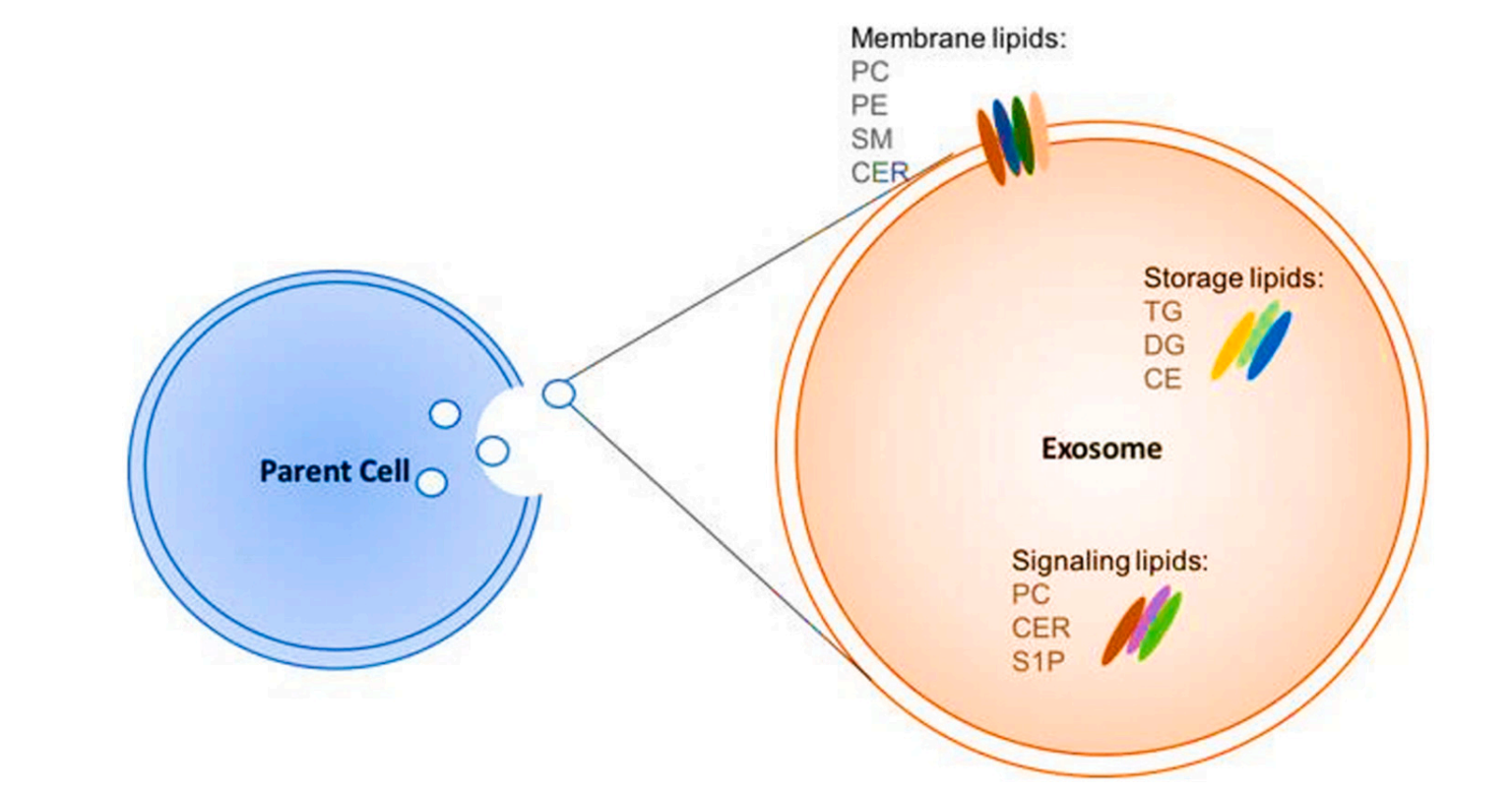Exosomes Lipidomics Services
- Identification and Analysis of Lipids and Their Metabolites
- Pathway Analysis and Network Study of Lipid Metabolism
- Regulation of Lipid Function and Metabolism
- Phospholipids (e.g., PC, PE, PS, PI)
- Sphingolipids (e.g., ceramides, sphingomyelins)
- Sterols (e.g., cholesterol and sterol esters)
- Fatty acids (e.g., free fatty acids and glycerolipids)
- Neutral lipids (e.g., triacylglycerols)
- Oxidized lipids
- Eicosanoids
Exosomes serve as essential mediators of intercellular communication. Among their diverse cargo—proteins, nucleic acids, and metabolites—lipids play both structural and functional roles. Exosomal membranes are enriched with a specific subset of lipids, including sphingolipids, phosphatidylserine, phosphatidylcholine, ceramides, cholesterol, and glycosphingolipids. Far beyond being simple membrane constituents, lipids are integral to exosome biogenesis, cargo sorting, vesicle trafficking, fusion with recipient cells, and modulation of immune responses. Alterations in exosomal lipid composition have been associated with various disease states, making exosomal lipidomics a highly informative tool in biomarker discovery and therapeutic development.

Figure 1. Lipid Composition of Exosomes
To meet the growing demand for high-quality exosomal lipid analysis, MtoZ Biolabs provides specialized Exosomes Lipidomics Services. Our Exosomes Lipidomics Services integrates state-of-the-art MS technology with optimized lipid extraction protocols and expert bioinformatics support. We offer accurate, quantitative lipid profiling tailored to a wide range of research needs from biomarker discovery to mechanistic studies.
Service at MtoZ Biolabs
MtoZ Biolabs' Exosomes Lipidomics Services are designed to uncover the complex lipid landscape of extracellular vesicles. Our platform supports both targeted and untargeted lipidomics approaches, utilizing advanced LC-MS and GC-MS instrumentation to achieve sensitive, high-throughput, and reproducible analysis.
We provide the following key services:
Our lipidomic analysis covers a wide range of lipid categories, including but not limited to:
By tailoring the analytical strategy to your specific research needs, MtoZ Biolabs ensures high-resolution insights into exosomal lipid composition and metabolism, supporting studies in disease biomarker discovery, cellular communication, and lipid-based therapeutics.
Analysis Workflow
1. Exosome Isolation and Purification
Isolation of high-purity exosomes from biofluids or conditioned media using differential ultracentrifugation, size-exclusion chromatography, or commercial purification kits.
2. Lipid Extraction
Optimized solvent-based extraction to efficiently recover a broad range of lipid species.
3. Instrumental Analysis
High-resolution LC-MS or GC-MS used for targeted or untargeted lipid profiling.
4. Data Processing
Identification and quantification of lipid species using validated lipid databases and software.
5. Bioinformatics Interpretation
Pathway analysis and statistical interpretation to reveal lipidomic alterations and biological significance.
Service Advantages
☑️Advanced Analysis Platforms: Equipped with both LC-MS and GC-MS systems to cover a broad range of lipid species with high sensitivity and resolution.
☑️High Purity and Reproducibility: Utilizes standardized exosome isolation and lipid extraction protocols to ensure consistent and high-quality data.
☑️Expert Data Interpretation: Integrated bioinformatics support for lipid identification, classification, and metabolic pathway analysis.
☑️Comprehensive Lipid Coverage: Detects multiple lipid classes, including phospholipids, sphingolipids, glycerolipids, sterols, and more.
Applications
1. Disease Mechanism Studies: Reveal lipid dysregulation in conditions such as cancer, neurodegenerative diseases, cardiovascular disorders, and metabolic syndromes.
2. Biomarker Discovery: Identify exosome-associated lipid signatures as potential diagnostic, prognostic, or therapeutic biomarkers.
3. Drug Development and Evaluation: Assess lipid-based drug delivery systems and study the impact of therapeutic interventions on exosome lipid composition.
4. Cell Communication and Signaling: Explore lipid-mediated intercellular signaling mechanisms facilitated by exosomes.
Sample Submission Suggestions
1. Sample Types
We accept various sample types, including animal tissue, plant tissue, serum/plasma, urine, saliva, CSF, cell culture, and other biological samples.
2. Storage and Shipping Conditions
Samples should be stored at -80℃ and shipped with dry ice. Avoid repeated freeze-thaw cycles.
*Note: If you have specific requirements or need guidance on sample preparation, please do not hesitate to contact us.
Deliverables
1. Comprehensive Experimental Details
2. Materials, Instruments, and Methods
3. Total Ion Chromatogram & Quality Control Assessment
4. Data Analysis, Preprocessing, and Estimation
5. Bioinformatics Analysis
6. Raw Data Files
Related Services
Exosome Separation & Purification Service
Exosomes Identification Service
How to order?







